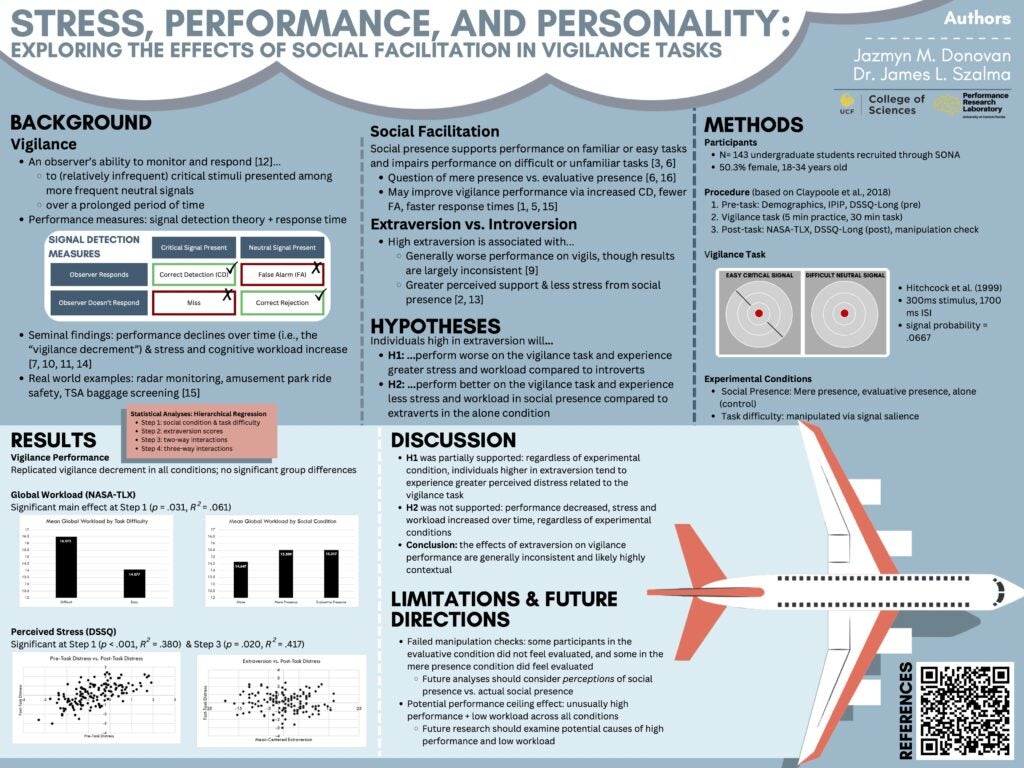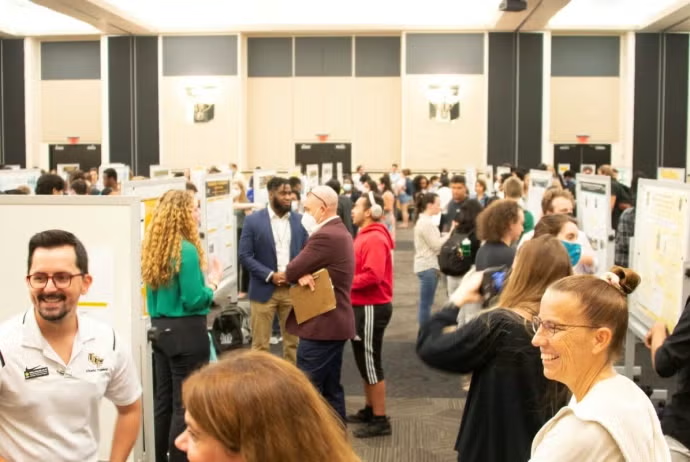This spring, two of our students—Ariana DeBoo (undergraduate senior) and Jazmyn Donovan (Ph.D. student) presented their research at UCF’s annual Student Scholar Symposium. Both presentations were awarded the Judge’s Choice Award, earning a $500 scholarship!
“Stress, Performance, and Personality: Exploring the Effects of Social Facilitation in Vigilance Tasks” by Jazmyn Donovan & James Szalma

Performance on vigilance tasks—attention-based tasks requiring observers to respond to infrequent critical signals presented among frequent neutral stimuli—has been shown to decline over time. Meanwhile, stress increases throughout the task. Considering many real-world vigilance tasks involve safety and security, attenuating these trends has important applications. In addition to exploring the cognitive processes underlying vigilance, researchers have examined the effects of environmental factors. Social environment has shown to impact vigilance performance such that social presence improves performance on some measures, a phenomenon known as social facilitation. However, there have been contradictory findings in this research. The current study examines how task difficulty might impact vigilance performance and stress, given that task difficulty has been shown to impact the social facilitation effect. The study also explores the performance differences between introverts and extroverts, building on existing individual differences research in both the vigilance and social literatures. It was found that all participants experienced high stress as performance declined, but that extroverts experienced greater stress and performed worse than introverts regardless of experimental condition. These findings suggest that vigilance continues to be highly stressful and cognitively demanding across conditions.
Vinyl to Viral: Evaluating the Mere Exposure Effect Through Music and Technological Advancement by Ariana Deboo, Jazmyn Donovan, & James Szalma
The present study examined the environmental influences of preference through repeated exposure to music. The Mere Exposure Effect (MEE) refers to a pattern in which a person develops a psychological preference for a stimulus repeatedly presented. TikTok, Reels, and Shorts are social media platforms that influence where people listen to music. The algorithm for new media is provided by quick, entertaining videos that allow users to scroll past content that does not hold their attention. A total of 406 participants (n=406) were involved in this study. This study aimed to identify how different technological contexts (i.e., platforms or media through which music could be consumed) moderate the relationship between music enjoyment and music familiarity. This music cognition study examined how listening patterns relate to enjoyment levels. Concepts relating to Technological advancements have made music readily accessible to streaming platforms such as Spotify, Apple Music, and Pandora. Participants completed an online, self-paced Qualtrics survey accessed through their SONA portal using a personal device, which included pre-task demographic questions, screentime questions, and six musical listening tasks. Following the listening tasks, participants received a debriefing form. The results revealed that different technological contexts do affect the relationship between familiarity and enjoyment. The strength of the MEE differed in each evaluated technological context, having the most decisive influence on participants who reported owning physical music (i.e., vinyl, CD). Implications of this research apply to many fields and settings, including marketing design, consumer interaction, and education.
